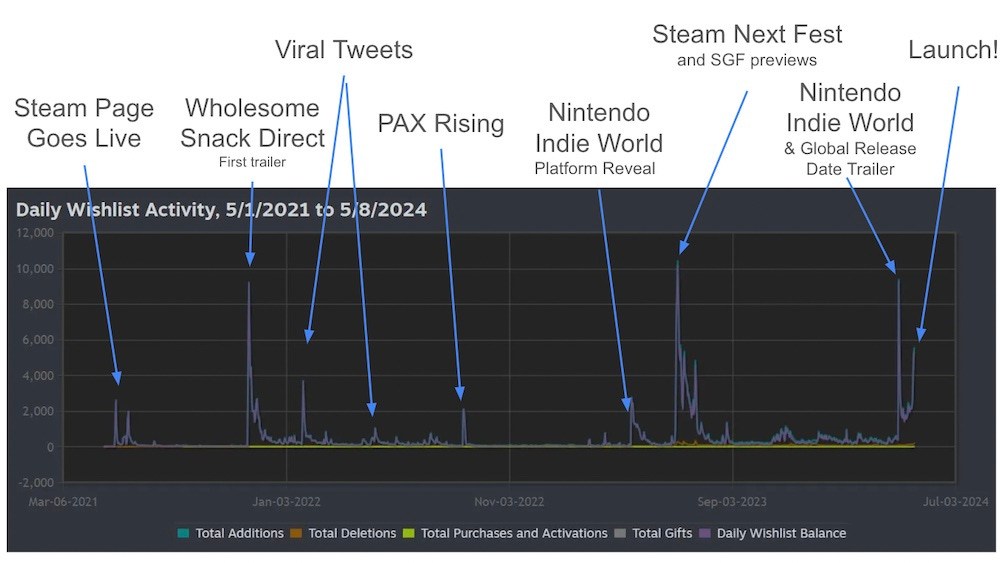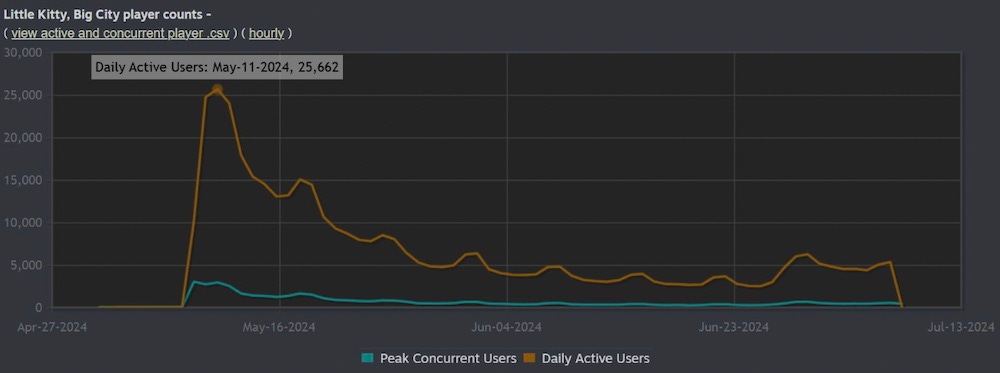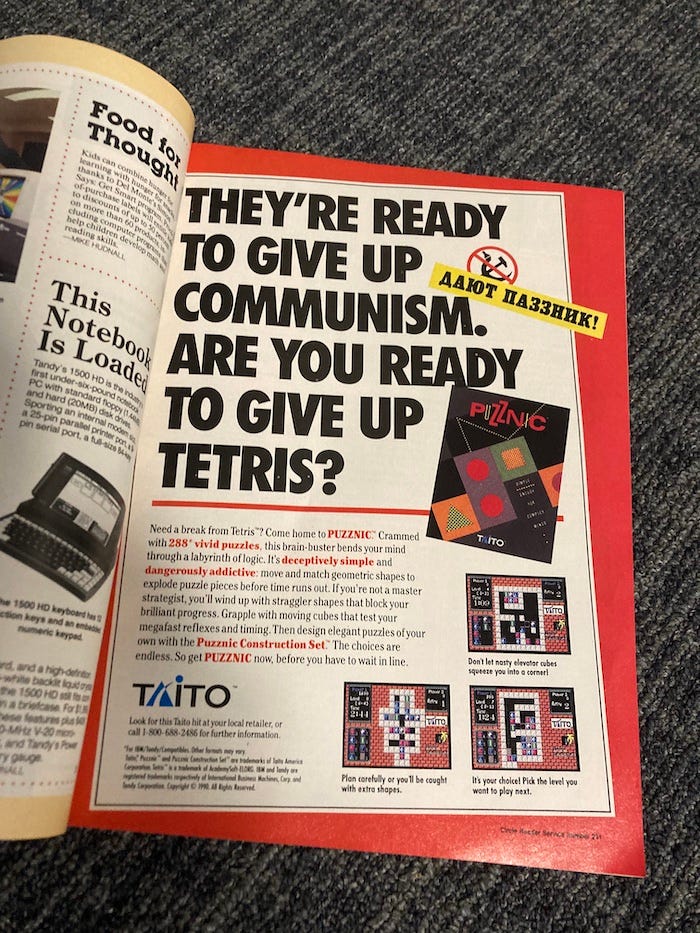How Little Kitty, Big City purred into millions of homes!
Publikováno: 16.7.2024
Also: those Xbox Game Pass changes, and a whole buncha news...
[The GameDiscoverCo game discovery newsletter is written by ‘how people find your game’ expert & company founder Simon Carless, and is a regular look at how people discover and buy video games in the 2020s.]
Since we imagine you’re all sunning yourselves at the pool right now - not slaving in front of a hot monitor trying to juice your social stats (rite?), welcome to another relaxed, cooler than a ‘Banana & Cucumber’ (?) edition of the GDCo newsletter.
And a little summer treat, before we start: imagine our delight, while listening to Kool & The Gang’s ‘Summer Madness’ the other day, in discovering a new Digging The Greats video, ‘How Jazzy Jeff and Fresh Prince Made The Ultimate Summer Song’. A wholesome Will Smith video in 2024? Heavens to Murgatroyd…
[PLZ NOTE: you can support GameDiscoverCo by subscribing to GDCo Plus now. You get full access to a super-detailed Steam data suite for unreleased & released games, weekly PC/console sales newsletters, Discord access, eight game discovery eBooks & lots more.]
How Little Kitty, Big City is catnip to millions…
We’ve been watching Double Dagger Studios’ single-player 3D adventure platformer Little Kitty, Big City since its May 9th release on Xbox (& Game Pass), Steam & Switch. We can tell its Steam sales are great - it has >4,600 Overwhelmingly Positive reviews and a concurrent user count in the hundreds, even two months after release.
But we also monitor U.S. Switch eShop ‘most downloaded’ charts for our Plus subscribers, and it’s been the top ‘recent’ game constantly since launch - and at a higher overall ranking than normal top-sellers. So we had to know more.
And in reaching out to Double Dagger’s Matt T. Wood - who worked at Valve* for almost 17 years before going indie to make this game in 2019, we found a fascinating story - a well-crafted, wholesome title which filled a big market niche, and has already been enjoyed by way more than 2 million players.
[*Re: ‘Steam & nepotism’, Matt tells us “I don’t think I was treated any differently or had any additional knowledge about Steam or Valve that worked to my advantage.” And given the game’s performance on other platforms, we would tend to agree.]
So let’s hit the numbers first. To start, Matt reveals: “At the time of writing this, we’ve had over 2 million unique [Xbox] Game Pass users play the game. That is absolutely insane.” GameDiscoverCo estimates Little Kitty, Big City as the #4 most-played new Game Pass title of the year, only behind Palworld, MLB: The Show 2024 and Hellblade II.
LKBC isn’t on PlayStation (yet!) But on on other ‘paid’ platforms, Wood reveals: “The ratio between Switch and Steam is about 2.4 : 1.8, which means Switch is currently selling almost 30% better than Steam.” He also told us 132,000 copies were sold on Steam in May 2024 alone. (GDCo speculates the game might be approaching 500,000 copies sold soon between both platforms, at $20-$25 a copy.)
Little Kitty Big City took a while to ‘build’ to its 464,000 Steam wishlist balance at launch. As you get see in this Steam wishlist graph (above), it appeared on Steam in 2021, but picked up momentum with a debut trailer in late 2021’s Wholesome Direct.
From there, Nintendo’s promotion of the game in two Indie Worlds clearly helped, as did some viral Tweets and an appearance in Steam Next Fest - which led lots of demo downloads, and high-profile YouTubers like Gab Smolders picking the game up.
The game does have a biggish chunk of U.S. players on PC, by the way. The ‘players by region’ stat in its ‘daily actives’ section of Steam has the game at 32.5% U.S., 14% China, 6.5% Germany, 5.5% U.K., 3.7% Canada, 3.2% France, 2.8% Brazil, 2.7% Taiwan, 2.6% Japan, and downward from there. (Interesting player split.)
The game’s Steam-only DAU (above) is impressive, too: >5k daily players even now is great, given that the title is not infinitely large. (How Long To Beat? has it at 2 and a half hours to beat the main story, but more like 4-5 hours, going at a ‘normal’ pace.) So yes: in today’s ‘massive content scope at all costs’ treadmill, cuteness can still win.
Which gets us past the ‘look, it sold great’ part of the analysis, and on to the ‘why did it sell great?’ bit. We’ve got some opinions, which we will augment with dev quotes:
Stray is the
elephantginger tabby cat in the room for this subgenre: BlueTwelve & Annapurna’s 2022 ‘cat x cyberpunk’ adventure, which we now estimate at >13 million players (!) LTD, unleashed years of pent-up demand for 3D adventures where you play as a cat.But Little Kitty, Big City was an independent idea, from a different angle: Matt notes that in 2019: “I was not aware of any other 3D games… like the one I was creating. I was teaching my kids about programming and making games and… one of them said, “What if we could play as a cat?”” Wood did say that releasing after Stray helped him “react to the criticisms and critiques of it”, and improve his own title.
What’s more, Stray isn’t a straight ahead ‘cat mischief’ sim: Stray is a little dark for a family audience. And notably, multiple Steam reviewers compare LKBC to a different title: “I was recommended this game and told it was like Stray, it's not. This is more like Untitled Goose Game, but you're a cat.” And yes, folks, Untitled Goose Game has also sold many millions of copies. (So either comparison is just fine!)
So I think we’re getting to the heart of it - people love animals. And people love playing as animals and causing chaos. And if you read reviews for Little Kitty, Big City, the “fantastic animation” and “whimsical… stylized” approach are what’s unlocked all this love - and sales. A small, but well-formed sandbox is what people want, here. (With animals causing chaos, adorably, which is an oddly under-served market.)
Finishing things off with comments from Wood himself on what he thinks helps Little Kitty, Big City stand out:
The game’s first trailer was a perfect setup for attracting fans: Wood notes:“we are very proud of the first trailer we made and how it performed.” It’s true - it has a great hook (cat lost in city) and such a charming soundtrack and animation combo. He adds: “We would never have made that trailer without Wholesome Games” reaching out and asking. So… great job, them.
Steam Next Fest was the big pre-release win for LKBC, not TikTok: Wood says: “TikTok was not a win for us when it came to discoverability and traffic”, at least not from first-party posts. For him: “The biggest win for the game pre-shipping was doing the Steam Next Fest.” (You can see that in the Steam wishlist graph above.)
Switch success was ‘natural’ - core Game Pass players, less so: since Nintendo “fosters an audience that embraces family friendly, non-stressful, cozy, exploration games for all ages”, the game fits perfectly there. But Wood also adds: “I’ve received more than a few emails from Game Pass players who normally only play Gears of War or Halo, and they gave LKBC a shot and had a lot of fun.”
Finally, we did quiz Wood about dev team size, because frankly - we can never tell nowadays, and so many micro-indies are breaking out. He explains: “It was just myself for maybe half of the development time, and then I started hiring a few contractors here and there as I needed help.”
Overall, the game has 3-5 ‘core’ contributors. And for the last 2 and a half years, it had a full-time animator, 2 additional part-time programmers, a part-time writer, and help with sound, composition, porting, and Popagenda on the PR/marketing & biz side.
So this isn’t micro-indie, more like ‘modular indie’. And Wood concludes, fondly: “It cost me more to make the game than I was expecting (big sarcastic surprise!), but I also made that back very quickly (also big (but genuine) surprise!).” And that, folks, is a big win nowadays.
Xbox Game Pass’s changes - what do they mean?
The news on Xbox’s Game Pass tier and subscription changes dropped last week, just after our last newsletter. It was done via the ‘help’ section of the Xbox website, rather than an official blog post or exec, if that’s a hint as to how MS envisaged its reception.
We’re presuming most of you have spotted it. But The Verge’s Tom Warren had to make full use of X/Twitter’s edit function to explain the new tiers: “Xbox Game Pass Core - $9.99 / no day one games; PC Game Pass - $11.99 / day one games; Xbox Game Pass for Console (existing subs) - $10.99 / day one games; Xbox Game Pass Standard (new only) - $14.99 / no day one games; Xbox Game Pass Ultimate - $19.99 / day one games.”
Back when Microsoft announced Call Of Duty as a Game Pass Day 1 title in late May, we did say: “We’re still wondering if Game Pass pricing will go up between now and CoD’s release.” And that is indeed what happened. Console players who want to get CoD Day 1 and play it multiplayer will be paying at least $20/month, no matter what.
Rebekah Valentine at IGN asked me for comments on the change, alongside some other eggheads, and here’s what I said: "When you have to increase revenue – as Xbox bosses do – you only have a couple of levers when it comes to Game Pass. It's either volume or yield. And it's clear that volume has been leveled out for some time, across both Game Pass Core (formerly Xbox Live Gold) and actual Game Pass.”
I concluded: ‘“Xbox has done a good job of gradually shifting their subscribers from the cheaper Live Gold to Game Pass. But now they need to keep growing – and/or continue to pay for the bigger [Xbox] division they've created with all these acquisitions.” Numbers need to go up, and many Xbox players will pay more* for those Day 1 titles. So now… they are.
[*Of course, many of them aren’t explicitly choosing to pay more - they’re just explicitly choosing not to cancel. Or forgetting they have the subscription entirely. I personally - sample size of one - have now cancelled my existing Game Pass Ultimate subscription. YMMV.]
Some other notes and analysis on the changes, which aren’t QUITE so complex, if you just look at existing options and ignore grandfathered-in tiers, btw:
PC Game Pass players retain more competitive pricing: yep, PC only players who want to play multiplayer Call Of Duty on Day 1 are ‘only’ paying $12 a month, as Microsoft dearly hopes to grow this market. (FYI: you need both Game Pass Core and Game Pass Console - or Ultimate - for multiplayer on console.)
The splitting-out of Game Pass Day 1 titles is against Xbox’s ‘vibes’: Patrick Klepek made an excellent point: “Making “day one” games part of a more expensive tier makes logical sense! But it runs in the opposite direction of [Xbox’s] entire marketing strategy for the past few years.”
Most - but not all - online reactions have been negative: the one op-ed that Xbox’s boss Phil Spencer re-Tweeted was GI.biz’s Chris Dring’s: “In a world where gamers are playing fewer, bigger, online games like Fortnite and Roblox, a service that encourages people to experience a variety of different titles might just be a good thing.”
This note coming directly after a newsletter section showing Little Kitty, Big City being exposed to players who wouldn’t have tried it? It’s a fair point. The counter-opinion is Ryan T Brown’s view: “long-term damage, short-term gains” for indies.
For us, there’s never been any direct proof of damage. We do think a lot of the players of indie titles were more AAA-centric Xbox players - who wouldn’t have sampled the games elsewhere. (We’ve seen other direct evidence in Xbox review comments.)
And we never found Steam conversion vs. expectation wavered with Day 1 Game Pass titles. Of course, it’s possible that Game Pass was part of a bigger sea change which led to ‘a specific subset of customers’ moving away from buying indie games? But we don’t have this high up our list of reasons for games selling poorly vs. expectations.
The game platform & discovery news round-up…
Let’s finish off this week’s free newsletter (Plus subscribers get a Steam sales analysis one on Friday!) by brandishing the latest discovery & platforms links in yer face:
What game is a U.S. console hardware-seller, even on Xbox? According to stock checks at Walmart.com, it’s EA Sports College Football ‘25, the first college (American) football game in a decade. Mat Piscatalla points out it regularly ranked in the Top 20 U.S. yearly best-sellers in its previous incarnation, too.
Some inadvertent leakage (via improper redactions) from the Valve vs. Wolfire suit: in 2021, Valve apparently employed 336 full-time employees, around 79 of them on Steam - and 41 on hardware. And its profit was >$2 billion in 2021 at a ~60% margin. (Nothing surprising there, if you track the company closely.)
Console subscription catalog update: PlayStation Plus adds Remnant II, Crisis Core: Final Fantasy VII Reunion, Mount & Blade II: Bannerlord & more to its higher tiers; Xbox has some notable third-party Game Pass Day 1 titles, including Flintlock, Capcom’s Kunitsu-Gami, and Dungeons of Hinterberg
A nice mini-fix for your Steam game’s page here: “a small but beneficial change to social media linking for your store pages. We've removed the cumbersome authentication loop for adding social media links and replaced that process with simple text fields.”
XR news: the FT is tracking the relative lack of Apple Vision Pro apps, with only “more than 2,000” available so far; Early Access tag replaces App Lab on Meta Horizon Store from August 5th; new XR platform from Samsung and Google will be announced, if not launched, this year; Meta offering 1-hour weekend trials for top multiplayer Quest games.
The extent to which MiHoYo’s games (Genshin Impact particularly!) have been well-monetized Western mobile, PC and console hits is underdiscussed. And we stumbled on this video of a U.S. ‘whale’ player discussing the $200k he spent in game with a vTuber. (Yes, the ‘gacha’ meta really stretches that far.)
Microlinks: Amazon’s Prime Day includes PC giveaways of Suicide Squad, Chivalry 2 and Rise of the Tomb Raider for Prime subs ; Golf Clash got in trouble with the UK’s advertising standards agency for not flagging ‘loot boxes’ enough in an ad; virtual world platform Rec Room is coming to Nintendo Switch,
Matthew Ball has a longform interview with Meta CTO Andrew Bosworth about XR adoption: “I think will get to the numbers that we're talking about, where it's hundreds of millions of people who have access and are using these technologies personally, professionally.” On the other hand, per Benedict Evans: “No matter how good the devices get, how many people will care?”
There was mass panic on a ‘dogs and cats living together’ level when PR folks found out the ‘show business email address for YouTubers’ link had been removed. But good news, it’s back again, as of yesterday - maybe it was a bug? (Or YouTube got spooked at the reaction - either way.)
Demos are important nowadays, right? Danny O’Dwyer outlines the history and future of game demos on the A16Z Games YouTube channel, asking “are demos a relic of the past or a necessary component in making future hits ‘stand out’?” (Answer, in his view: Y to the latter.)
Microlinks: Star Wars Outlaws remains IGN's most wishlisted game of 2024 in IGN’s Playlist app; Tencent and NetEase have started integrating Palworld-like modes into existing games like Eggy Party; fading UK physical game retailer GAME is now ending pre-orders, as digital continues to dominate.
Finally:, as highlighted by my buddies at the Video Game History Foundation, ‘90s video game print ads could be wild. How about this one? “In 1990, as the Soviet Union collapsed, Taito's [block puzzle game] Puzznic decided to... use the news story to promote Puzznic, via this… ad calling out Tetris?” Not much perestroika here:
[We’re GameDiscoverCo, an agency based around one simple issue: how do players find, buy and enjoy your PC or console game? We run the newsletter you’re reading, and provide consulting services for publishers, funds, and other smart game industry folks.]


